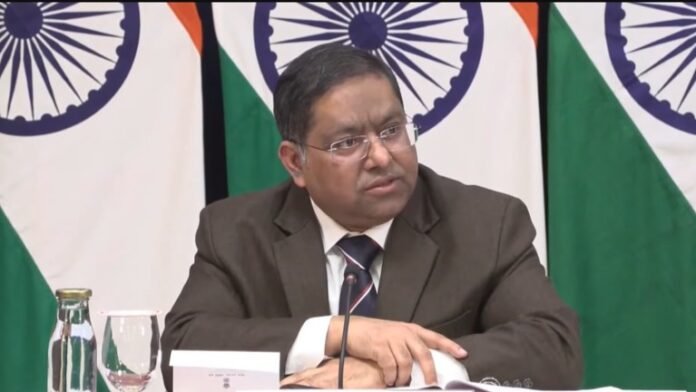India on Wednesday issued a strong rebuttal to Pakistan Army Chief General Asim Munir’s recent statement invoking the “two-nation theory” and Kashmir issue, asserting that Pakistan must first vacate Pakistan-occupied Kashmir (PoK) before making any further claims. The Indian Ministry of External Affairs (MEA) termed Munir’s remarks as “provocative and misleading”, calling them an attempt to divert attention from Pakistan’s domestic turmoil and deep-rooted internal crises.
The response came a day after Gen Munir stirred controversy during a speech marking “Youm-e-Takbeer”—Pakistan’s annual celebration of its nuclear test—where he referred to the partition of India based on religion and reignited old sentiments over Kashmir, claiming the region’s unresolved status was a “core issue” between the two countries.
India Rejects ‘Two-Nation’ Theory Revival
Reacting sharply to the remarks, MEA spokesperson Randhir Jaiswal called them “an outdated and discredited notion”, emphasizing that invoking the two-nation theory in 2025 reflects a regressive mindset. “The people of India have long rejected such divisive ideologies. Our focus remains on peace, development, and unity,” said Jaiswal.
He further pointed out that the two-nation theory had not only failed to hold ground in history but had also brought endless instability and conflict to the region, particularly within Pakistan itself. “Attempts to use such rhetoric only reinforce Pakistan’s inability to look ahead constructively and responsibly,” the MEA statement said.
The Kashmir Assertion and India’s Firm Stance
General Munir, during his address, alleged that “India continues to deny the people of Kashmir their right to self-determination.” In response, India reaffirmed that the Union Territory of Jammu & Kashmir is an integral and inalienable part of the country, and any attempts to interfere in its internal matters will be firmly resisted.
New Delhi took the opportunity to reiterate its long-standing position that PoK is under illegal occupation by Pakistan and must be returned. “Pakistan must first vacate all territories under its illegal occupation, including Gilgit-Baltistan,” said the MEA.
India also pointed to the massive human rights violations in PoK, noting that the voices of local residents demanding freedom from Pakistani control are growing louder. In recent years, several protests and demonstrations have erupted in PoK over the lack of development, suppression of civil rights, and economic exploitation by the Pakistani government and military.
Strategic Timing Raises Eyebrows
Many analysts believe General Munir’s speech is an attempt to bolster nationalist sentiments in Pakistan amid ongoing economic hardships, political instability, and strained civil-military relations. Pakistan is currently grappling with record inflation, a depreciating currency, and an unpopular interim administration following disputed elections. Military leaders have historically invoked the Kashmir issue and anti-India rhetoric to unite the nation during periods of internal distress.
By reviving the emotionally charged two-nation theory and framing India as a threat, the Pakistan Army may be trying to regain its waning credibility among the populace, especially as public dissatisfaction with military interference in politics has grown over the years.
International Implications
India’s sharp rebuttal also carries a message to the international community. By bringing attention to Pakistan’s role in nurturing cross-border terrorism and undermining peace in the region, New Delhi sought to draw a clear distinction between itself as a responsible democracy and Pakistan as a nation struggling with extremism and governance issues.
Indian officials noted that while India is being recognized globally for its economic rise, digital growth, and diplomatic initiatives, Pakistan remains mired in instability and outdated ideologies. They urged international observers to recognize the destructive role of Pakistan’s military establishment in regional peace efforts, especially regarding Afghanistan, Balochistan, and Kashmir.
India’s Focus on PoK Intensifies
In recent months, there has been a noticeable uptick in India’s emphasis on reclaiming PoK, both diplomatically and politically. Several Indian leaders, including Defence Minister Rajnath Singh and Home Minister Amit Shah, have asserted that PoK is part of India by constitutional right and that efforts to integrate it will continue.
As India prepares for its 2026 strategic roadmap, which includes border security enhancement, infrastructure development in Jammu & Kashmir, and expanded global alliances, the call to vacate PoK has gained renewed momentum.
India’s rebuttal to General Munir’s remarks serves not just as a diplomatic statement, but also as a signal of its assertive foreign policy and refusal to engage with outdated, divisive narratives.

